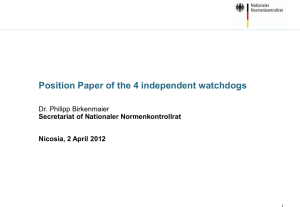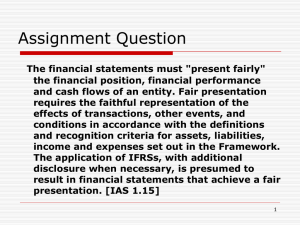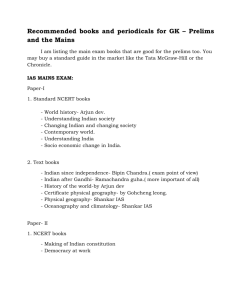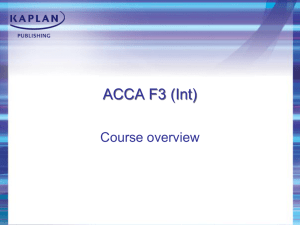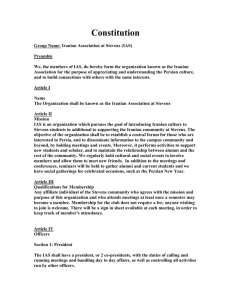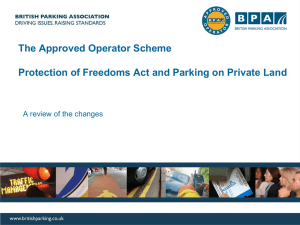Teaching at IAS and Living in Xela: FAQ`s - Inter
advertisement
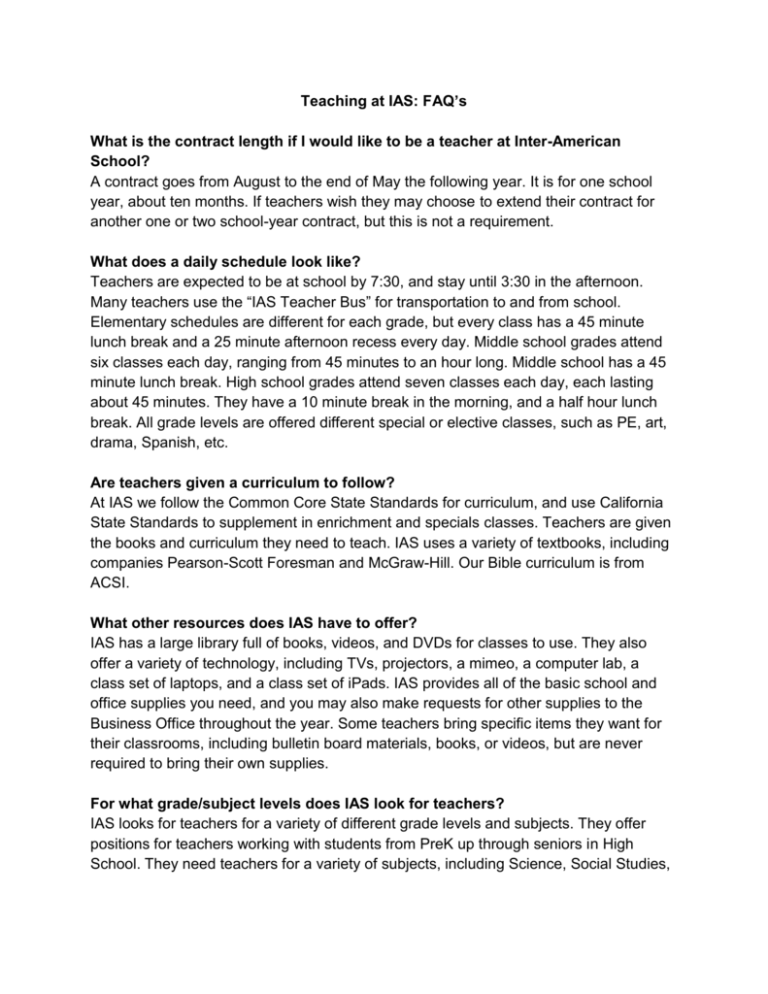
Teaching at IAS: FAQ’s What is the contract length if I would like to be a teacher at Inter-American School? A contract goes from August to the end of May the following year. It is for one school year, about ten months. If teachers wish they may choose to extend their contract for another one or two school-year contract, but this is not a requirement. What does a daily schedule look like? Teachers are expected to be at school by 7:30, and stay until 3:30 in the afternoon. Many teachers use the “IAS Teacher Bus” for transportation to and from school. Elementary schedules are different for each grade, but every class has a 45 minute lunch break and a 25 minute afternoon recess every day. Middle school grades attend six classes each day, ranging from 45 minutes to an hour long. Middle school has a 45 minute lunch break. High school grades attend seven classes each day, each lasting about 45 minutes. They have a 10 minute break in the morning, and a half hour lunch break. All grade levels are offered different special or elective classes, such as PE, art, drama, Spanish, etc. Are teachers given a curriculum to follow? At IAS we follow the Common Core State Standards for curriculum, and use California State Standards to supplement in enrichment and specials classes. Teachers are given the books and curriculum they need to teach. IAS uses a variety of textbooks, including companies Pearson-Scott Foresman and McGraw-Hill. Our Bible curriculum is from ACSI. What other resources does IAS have to offer? IAS has a large library full of books, videos, and DVDs for classes to use. They also offer a variety of technology, including TVs, projectors, a mimeo, a computer lab, a class set of laptops, and a class set of iPads. IAS provides all of the basic school and office supplies you need, and you may also make requests for other supplies to the Business Office throughout the year. Some teachers bring specific items they want for their classrooms, including bulletin board materials, books, or videos, but are never required to bring their own supplies. For what grade/subject levels does IAS look for teachers? IAS looks for teachers for a variety of different grade levels and subjects. They offer positions for teachers working with students from PreK up through seniors in High School. They need teachers for a variety of subjects, including Science, Social Studies, English, Bible, Math, Spanish, PE, Art, and other resource positions. IAS is modeled after “normal” elementary, middle, and high schools that you would find in the U.S. Do you have to be a certified teacher to teach at IAS? Right now, certification is not necessary to be a teacher at IAS. IAS has worked with teachers from a variety of backgrounds and majors. However, preference is given to candidates who have teaching experience or a teaching certificate. All teaching candidates must have a Bachelor’s degree. Do you have to be fluent in Spanish to teach at IAS? IAS is an English Immersion school. Teachers and students are expected to speak only English at school (except, of course, in Spanish class.) Many teachers take Spanish lessons or attend Spanish schools to help with living in Xela and becoming a part of the community. IAS does offer benefits in their contracts that include a stipend for Spanish lessons. When does the interview and hiring process begin at IAS? Teacher candidates are encouraged to apply whenever they are interested in teaching at IAS. Starting in January and going through the end of February, administration will know which teaching positions will and will not be available for the following year. This information is posted on the school’s website and is updated often. During this time, administration will also start interviews (usually over the phone), and will begin offering contracts. What compensation is provided to IAS teachers? Teachers receive a living stipend, which covers housing, food, and for some even allows for a little traveling. Other benefits in the contract include money to study Spanish, health insurance, and either a partial or entire round-trip plane ticket, depending on how long you have worked at IAS. It is not necessary to raise support in order to live, but some teachers find it helpful to raise support to pay off loans or for savings. Our support partner is World Outreach Ministries, which is an online support program making it easy for friends and family to contribute financially. Are there times during the school year when teachers may travel? Teachers may travel whenever there are no classes. There are various holidays, including Guatemalan Independence Day, All Saints Day, Thanksgiving Weekend, Christmas Break, and Holy Week, and Guatemalan Labor Day. Teachers often use their weekends and holidays to explore Guatemala and the rest of Central America. A few hot spots include Belize, El Salvador, Mexico, and places closer to Xela such as Lake Atitlan, Rio Dulce, or Monterrico. It may be helpful to bring a Lonely Planet for Guatemala or the larger region. There is a ton to do and see here! What extra-curricular activities can teachers get involved in? The extra-curricular activities that IAS offers depend on what teachers are willing to offer. In the past after school, teachers have coached different sports teams, hosted cooking clubs, planned youth groups, organized community service projects, and have offered after-school tutoring. What are the demographics of IAS? Students: 85% of our students are from Guatemalan families, most of whom are from affluent homes. They are largely children of business people, doctors, lawyers, etc. 10% of our students are children of missionaries from the US and Canada. 5% of our students come from various countries such as Mexico, Nicaragua, Korea, China, Australia, and the Netherlands. The majority of our students speak Spanish as their first language. Students come from a wide variety of religious backgrounds, with about 25% from Protestant and 75% Catholic. Inter-American School is Protestant evangelical and nondenominational. IAS does not accept students from cults, Mormons, or Jehovah’s Witness backgrounds. Many of our graduating students have the desire and the opportunity to continue their studies in foreign countries, including various universities in the United States, Canada, and other countries. Teachers: Teachers at IAS come from all different backgrounds, though they are mostly from the United States and Canada. Though the staff is often very diverse in their backgrounds, we are all bound together by our faith in Jesus Christ, our love for children, and the challenges of living in Guatemala. As Christians teachers, we must be able to work with people with different ideas, beliefs, and levels of conviction. Living in Xela: FAQ’s Where do people go to church? Some teachers attend St. Mark’s Episcopal Church which has an English Speaking Service and is led by a board member at IAS. Others find various Spanish churches to attend. Many years, teachers have also planned different group Bible studies for during the week. How does banking work? The Business Office at IAS will help you open a bank account that includes a debit card, checks, and online banking. You can easily exchange dollars to quetzals when you arrive, or use your ATM card from the states to withdraw additional money. What is the climate like? Xela does not have tropical weather. The city is at an elevation of 7,500 feet, and has cooler temperatures. The temperatures shift a lot during the day. It is cold in the mornings and evenings (30-50 degrees), and warms up (70-80 degrees) in the afternoon when it is sunny. There is a rainy season from mid-May to November, and a dry season from November to May. During the dry season, temperatures are lower at night, around 20 degrees. What clothes should we pack? A rain coat and rain boots for the rainy season. (You can buy an umbrella here) A warm jacket for the dry season. (Some teachers also bring a hat and mittens) Warm pajamas, as houses here do not have heating. Other teachers have brought a heated blanket for sleeping as well. Summer clothes and swimsuits for traveling. Areas around Xela have much warmer temperatures. 1-2 formal outfits for dinners, birthday parties, graduation, etc. Shoes comfortable and durable for a lot of walking on cobblestone streets. Shoes for hiking. (There are many great places to hike around Xela.) Clothes for teaching. At IAS, the faculty and staff are expected to dress professionally, described as business casual. Modesty is expected in teacher dress. (Skirts that go to the knee, shirts with straps that are at least three inches wide, close-toed shoes.) Only under special circumstances (field trips/school activities) are jeans and tennis shoes allowed. Do teachers need to find their own housing? Where do teachers live? The Business Office will help teachers find suitable housing, and the living stipend that teachers receive is enough to pay for housing. Most teachers start by living with a Guatemalan host family, as it’s easier to learn Spanish and you do not have to cook for yourself. The cost is usually between Q1,400 to Q1,600 per month. Returning teachers and married couples usually rent a house or apartment. Furnished apartments are usually between Q1,700 to Q2,000 per month. Electricity and water is often included in the cost, but depends on the place. What kind of medical attention is available? As an IAS employee, you will be signed up for health insurance with a Guatemalan company. The policy covers 80% of approved expenses, including prescription drugs. The school has several doctors and dentists that we recommend. Most medications are available at pharmacies without a prescription, but you will need to know the generic name rather than just the brand name. Not all drugs are available here, so it is wise to bring your own specific prescriptions. What shots or immunizations are required to teach in Guatemala? There is nothing that you need to get to be a teacher here. It is recommended by the North American Public Health officials that you are up to date on your Tetanusdiphtheria (Td or dT), meales-mumps-rubella (MMR), and polio boosters. They also recommend Hepatitis A and B series. Do I need a special adapter for my electronics? You do not need an outlet adapter for personal electronics that you bring. Curling irons, straighteners, and hairdryers are more expensive to buy here, so we recommend bringing your own if necessary. Most teachers bring personal laptops and iPods. It is generally safe to have these items, however it is not wise to flaunt them. The school has plenty of Mac computers for teachers to use in their off periods as well. How can I access the internet? We have wireless Internet on the entire school campus. For internet at home you can purchase a pre-paid wireless Internet service that goes in your computer´s usb port. Internet cafes are abundant and it costs approximately Q3/hour. Can I get a cell phone? Almost every teacher buys a pre-paid cell phone. Simple phones are about $25. You can either purchase a monthly plan or buy minutes that you add to your phone. How do I send and receive mail/packages? We can receive mail and packages. The national mail system for Guatemala is not very reliable and is only safe for postcards and letters, so make sure you don’t send anything of value, especially cash or checks. It can take up to one month for delivery. If you want to have something sent through this system, here is the address: Inter-American School Apartado 24, 09901 Quetzaltenango, Guatemala The other mail option is our courier service, which delivers letters and packages for a charge of $0.20/ounce. This can be very expensive if you receive a large care package, and the cost of delivery is taken out of your monthly paycheck. Should you want to use this service, the address is: Inter-American School / GUA2059 PO Box 526125 Miami, FL 33152-6125 USA What is transportation like? Xela is a very walkable city, but also offers buses (Q1.25-2) and taxis (Q30-40). Getting out of town is easy as well. There are buses that go anywhere imaginable in Guatemala and beyond. Is Xela a safe place to live? Though a few teachers have been the victims of some petty crime, Quetzaltenango is generally a safe place to live. Using common sense and being cautious will save you from most problems with crime: Don’t walk alone at night, don’t carry a lot of cash, and be wary of strangers. What should I be sure to pack? A good Spanish/English dictionary Extra cash for when you come, as the first month can be financially tight. Rain boots, rain jacket, and a warm jacket More pants and warm clothes than summer clothes We have a large library at school, a second hand bookshop, and all the DVDs you may wish to find. Also, there are many great thrift stores called “pacas” where you can buy any clothing item you forgot or didn’t have room to pack.
